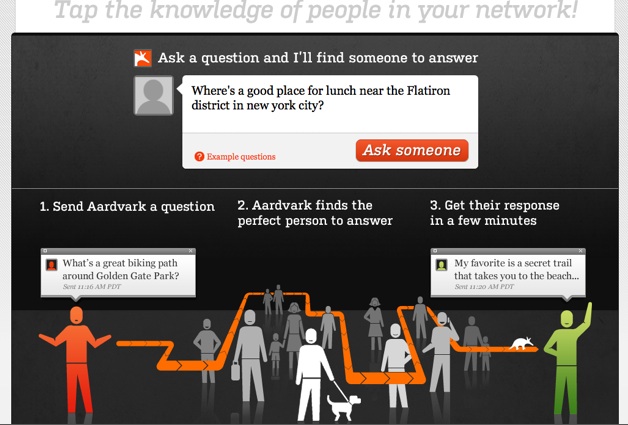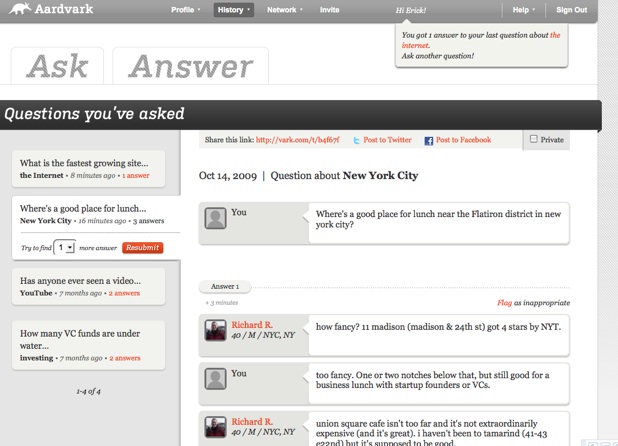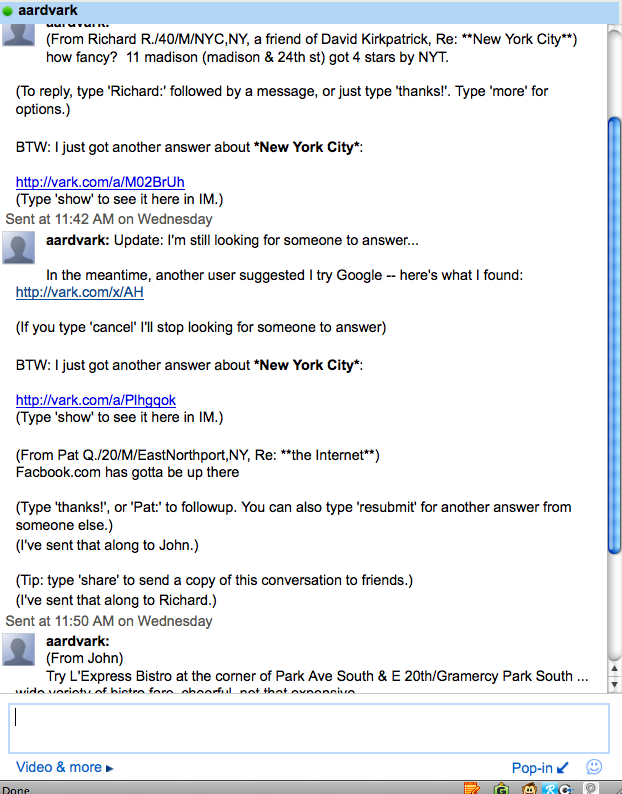
When you want an answer to a question, you want it now, which is why the social Q&A service Aardvark first launched as an IM client, then via Facebook, then Twitter. Only today is it opening up its Website as a general social search engine. And it’s just a much better interface than the command-line-reminiscent prompts in the IM interface.
You still have to sign in or sign up for the service, which sends your question to people in your extended social network (usually on Facebook, but also Gmail or Hotmail contacts) who are also on Aardvark. In the IM client, this results in a somewhat annoying back-and-forth, interspersed with tips from Aardvark about what text commands to use to unleash more functionality (see bottom screenshot). On the new Website, you simply ask a question, and it goes out to find answers, which are then displayed in logical groupings.
For instance, I asked for suggestions for a good place to eat in near the Flatiron District in New York City, where my office is located. Within 11 minutes, I got three very good answers, including the ability to go back and forth to refine the answer. Richard R. (a friend of my former Fortune colleague David Kirkpatrick), asked how fancy I wanted the restaurant to be, and suggested 11 Madison, which is an excellent choice, but too fancy for a place to grab lunch with startup entrepreneurs. He then followed up with two other solid suggestions: Union Square Cafe (which is close, but not really in the Flatiron District) and Tamarind.
These are all good ideas, but I could have found them on Zagat’s as well. But three other people also gave me answers (all within 11 minutes). One suggested a nearby French Bistro I had forgotten about, but which is very good and cheap. Another pointed to a couple newer spots I have heard of but never tried out. And one came back with a restaurant that is just about to open called RYE. Now I feel like I’m in the know. Thanks Aardvark!
I tried this same question on rival Q&A site Hunch, but all I got back were results for places to eat and drink in Hell’s Kitchen. Wrong answer, too far.
I signed up for Aardvark a long time ago, and I’m constantly pestered with questions via IM which I simply don’t have time to answer (and I’m too lazy to change my settings). So I haven’t really been using it much. But with the Website, now I have a place to go when I have a question, and I’m definitely going to try it out some more. The downside of the Website is that you lose some of the real-time feel that you get through IM. You have to refresh the page to see new answers, for instance. It would be a simple fix, however, to stream the answers down the page as they appear. Currently, you just get an indicator of how many new answers are waiting for you.
I understand why Aardvark started out with IM and other methods before putting up fully-functioning Website. It had to build up users and a corpus of topics they can answer. When you sign up, you tell Aardvark what topics you are willing to be asked about, and Aardvark routes the questions appropriately. There are now more than one million topics Aardvark users can answer questions about and CEO Max Ventilla tells me that 90 percent of questions get answered within 5 minutes. And while he won’t say how many questions are being answered a day (it isn’t yet in the millions), he does volunteer, “We’re seeing days when we have one fifth the volume of Yahoo Answers.” Yahoo Answers attracts 15 million people a day (not all of whom ask questions).
Now people can go to the site and there is a built-in community of people who are ready to answer questions. You can either sign up (no more invites or Facebook login required), or just ask the Aardvark community at large without a sign-up. Unlike Yahoo Answers, previous answers are not searchable for everyone. The interactions remain semi-private, but they are also more immediate. With each new question, you’ll get an entirely new set of answers, depending on who within your social network responds.
Update: The folks from Hunch took exception to my example above, saying it isn’t a fair comparison and that, well, I didn’t ask the question correctly. Co-founder Chris Dixon offers a couple comments below and co-founder Caterina Fake has this to say:
At Hunch, we’re big fans of Vark. But Hunch and Vark are very different products. On Vark, a question is asked by one person to another, and so natural language queries are used. Hunch is like Wikipedia for decisions, so on Hunch you’re searching for a topic that already exists.
Erick used the query “What is a good place for a restaurant in the flatiron district in New York?” for his query above, which is appropriate for Vark, but not for Hunch. However, if you search on Hunch for “flatiron restaurants” you would be shown this topic, which delivers a great experience. So good, in fact, that 90% of our users answer all questions and get to the result page.
Like Wikipedia, Hunch is not a search engine. We should definitely have good, even great search (the Hell’s Kitchen restaurants should not have come up), but our strong suit is not search.
Fair enough. I agree that Hunch’s suggestions in this case are decent once you find the right ones. But they shouldn’t be that hard to find.

